May 16, 2025 | 09:01 GMT +7
May 16, 2025 | 09:01 GMT +7
Hotline: 0913.378.918
May 16, 2025 | 09:01 GMT +7
Hotline: 0913.378.918
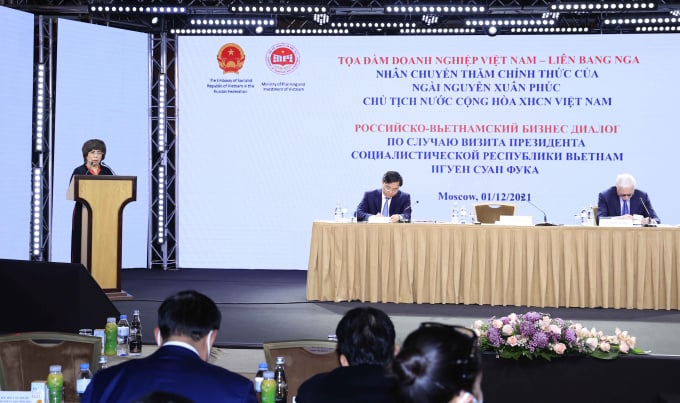
Thai Huong delivers her speech at the Viet Nam - Russia Business Forum. Photo: TH.
President Nguyen Xuan Phuc led a high-ranking Vietnamese delegation to pay an official visit to the Russian Federation between November 29 and December 2, 2021 at the invitation of President of the Russian Federation Vladimir Putin.
Labour Hero Thai Huong, Founder - Chairman of the Strategic Council of the TH Group also joins the high-level delegation during the first official visit to the Russian Federation of President Nguyen Xuan Phuc in his new position.
The group has been implemented the project of a complex of high-tech dairy farming and milk processing with a total investment of USD2.7 billion in Russia.
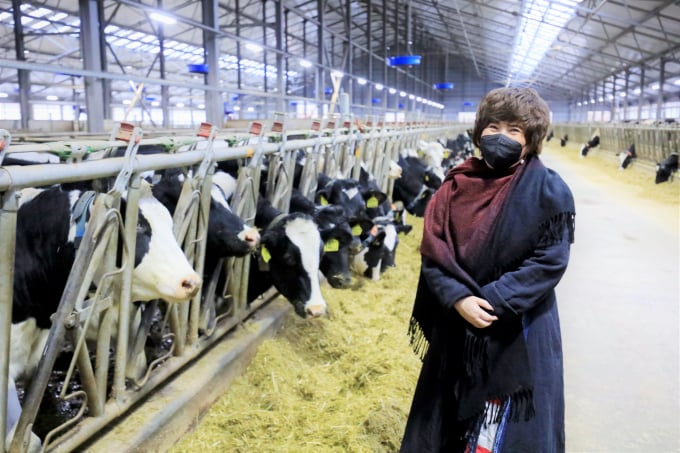
Thai Huong visits a dairy farm in Moscow. Photo: TH.
Speaking at the Viet Nam - Russia Business Forum in Moscow on December 1, Huong expressed her thanks to the State and the Government of the Russian Federation for supporting policies for the group to smoothly run the project.
We come to Russia not to compete with the cost of a glass of milk during the embargo period but to compete fairly with dairy companies in terms of price and quality, she said.
“We are not afraid of any dairy company in the world to compete with us in Russia because we have applied high technology, the most modern management science and we have selected the best dairy cow breed,” she added.
Raw milk from TH Farm in Moscow is high in protein and fat. Russia has a large and unpolluted land fund, so, it is very suitable for producing clean organic products, she said.
According to a representative of the group, the first phase of the project in Moscow has been completed about 90 per cent. Despite difficulties and obstacles due to embargo in US-Russia trade relations, the group has successfully imported 1,100 purebred high-producing HF dairy cows to Russia from the US.
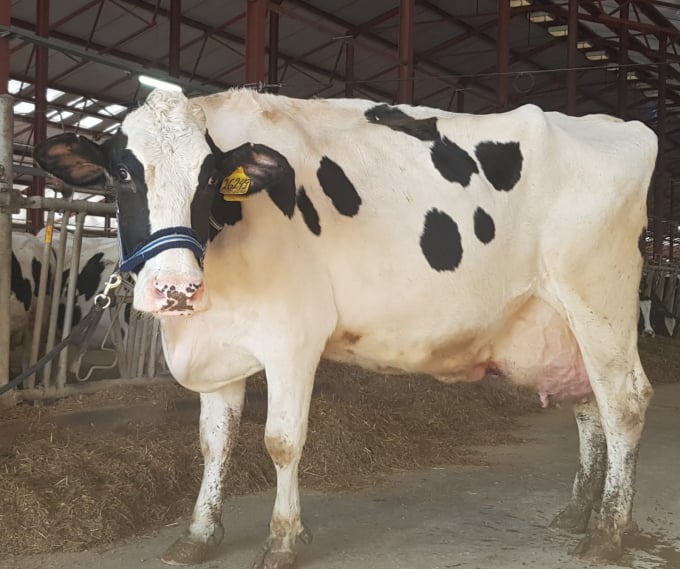
The dairy cow gives 104 litres of milk a day. Photo: TH.
The cows have adapted to the living conditions, growing very well and the total herd is now more than 2,000 individuals.
Each cow now has provided 40-41 litres of milk per day thanks to high-yielding genetic resources, high-tech techniques and advanced management science. The number is 2.5 times higher than the average milk yield of a Russia’s cow daily (only 17 litres per cow daily).
Even some cows of the group’s farm provide 60-104 litres of milk daily, she said.
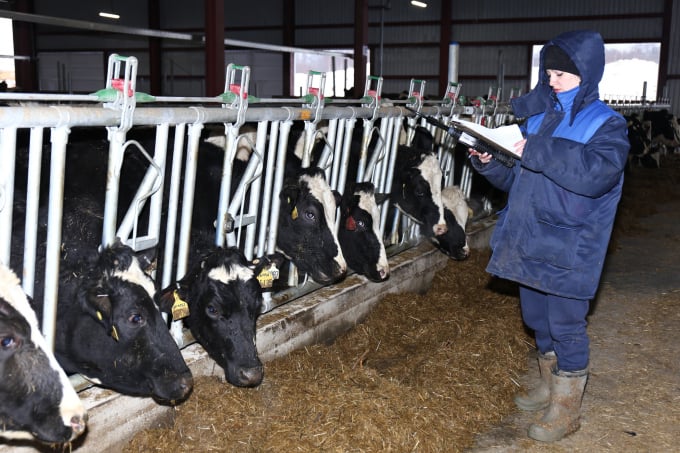
The Russian Federation has many advantages for the production of high-quality fresh milk. Photo: TH.
Russia has fertile soil, clean water and a temperate climate with two distinct seasons. Russians have a high demand for cow's milk - 340 kg/person/year while this number in Viet Nam and Southeast Asia is very low - only 25 kg/person/year.
Therefore, the group has decided to run the project in two localities of Moscow and Kaluga.
In January 2018, the group completed the construction of a part of the farm to raise cows in the Volokolamsk District, Moscow. The group has invested in large-capacity agricultural machinery to transform nearly 50,0000 ha of wasteland into fertile fields with great support in land access from the Russian Federation.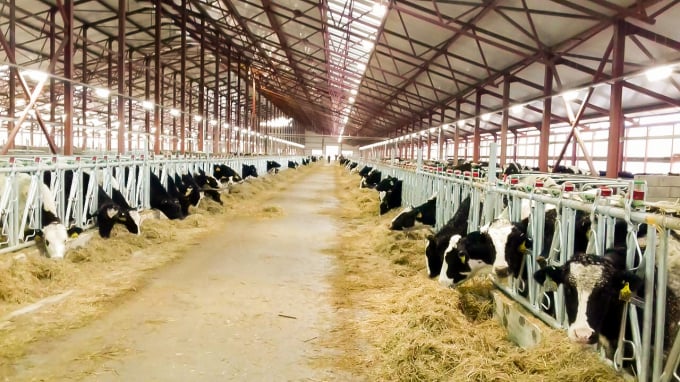
The second phase of the TH clean milk processing factory in Kaluga Province with a capacity of 1,000 tonnes per day will be completed in the fourth quarter of 2026. Photo: TH.
In Moscow, the first farm in the Volokolamsk District with a scale of 6,000 cows will complete the first phase in December 2021. The second phase of the project will be completed in April 2023. The second farm that raises 6,000 cows will be built in Shatura District since April 2023 and be completed in the fourth quarter of 2024.
In Kaluga Province, a farm in Ulyanovo District with a scale of 6,000 cows will complete the first phase in April 2022 and the second phase in April 2023. A farm in Khvastovichi District with the same scale will be completed in the fourth quarter of 2024.
The group is also completing the design of TH clean fresh milk processing factory in Kaluga Province. Under the first phase, it has a capacity of 500 tonnes. The factory, which has been built since December 2021, is expected to complete in the fourth quarter of 2023.
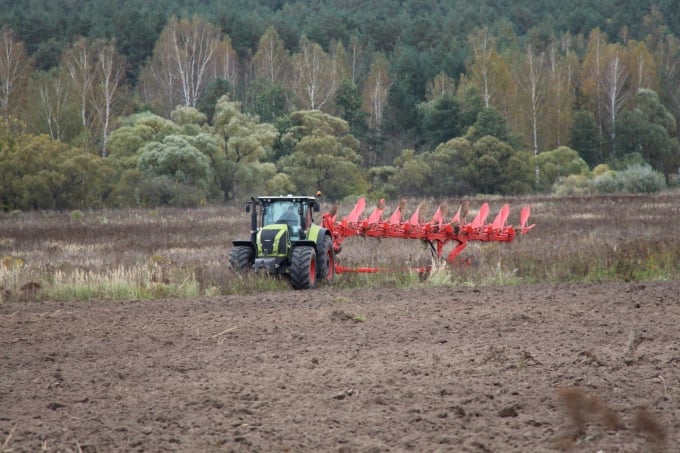
The group has invested in large-capacity agricultural machinery to transform nearly 50,0000 ha of wasteland into fertile fields in Russian Federation. Photo: TH.
The second phase of the factory with a capacity of 1,000 tonnes per day will be completed in the fourth quarter of 2026. Besides, the group will accelerate the process of officially launching the TH true MILK brand in the Russian market.
The project not only contributes to enhancing trade and investment exchanges between the two countries but also represents the sharing and accompanying with Russia to recover and develop agricultural production, bringing socio-economic benefits and contributing to enhancing Viet Nam's image in the international arena.
Translated by Thu Hang

(VAN) Cold-barn systems efficiently manage environmental and temperature conditions, which aids in the prevention of respiratory diseases in pigs and protects them from the vectors that transmit African swine fevers.

(VAN) To tackle challenges, the project 'Addressing key technical bottlenecks in the grouper supply chain in Vietnam' has been underway since 2024.

(VAN) The project 'Disease-Resilient and Sustainable Cassava Production Systems in the Mekong Region', funded by the Australian Center for International Agricultural Research (ACIAR), is being implemented from 2024 to 2028.

(VAN) Data from 10,000 farming households will help professionalize production organization and support the implementation of the One Million Hectares Program for High-Quality, Low-Emission Rice Cultivation.

(VAN) FAO Director-General QU Dongyu marks International Day of Plant Health at NENA conference.

(VAN) Deputy Minister of Agriculture and Environment Hoang Trung affirmed that floriculture and ornamental plants are a growing industry that receives significant global attention.

(VAN) The three staple crops dominating modern diets – corn, rice and wheat – are familiar to Americans. However, fourth place is held by a dark horse: cassava.